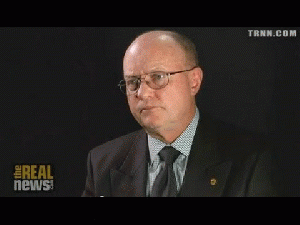Transcribed from the audio podcast posted here. Interview Transcript part 2 of 3.
Thanks to Eric Forat for transcript checking/editing.
R.K.: My guest tonight is Lawrence Wilkerson. He is retired United States Army soldier and and former chief of staff to United States Secretary of State Colin Powell. Wilkerson is an adjunct professor at the College of William & Mary where he teaches courses on US national security. He also instructs a senior seminar in the Honors Department at the George Washington University entitled "National Security Decision Making."
L.W.: Exxon Mobile's profits last year were bigger than what 60% of the world's countries' GDPs. They are. They are entities in and of themselves. You get a guy like Rex Tillerson, CEO of Exxon Mobile who gives a speech in Kazakhstan where in essence he said he would rather live in Kazakhstan because they have a better environment for energy development. I mean, these guys have no national loyalty. They have no feeling of fealty to a particular country, their fealty is to their fiduciary responsibility and their own wealth. That's it. Period.
R.K.: Well let's talk a little bit about that. Recently I had on the author of the book and the producer of the movie, The Corporation, have you seen that movie?
L.W.: No, I've heard about it, I haven't seen it.
R.K.: It basically goes through describing just how many ways corporations are like psychopaths.
L.W.: Yeah.
R.K.: And I'm really, I have really gotten interested in understanding psychopaths because I think they play so big a role in our culture, not the ones who get caught and go to jail but the smart ones who don't. And I think of them as, if there's one word I use for a psychopath, it's predator. And that's how we started this conversation.
L.W.: Yes. That's a good metaphor.
R.K.: So, can you throw together some thoughts about what we have talked about so far and psychopaths and predators of that nature?
L.W.: Well my principal concern with that particular way of characterizing corporations is that when you get into that kind of psychology, when you get into that kind of single-minded focus, you don't just get into efficiency and even effectiveness, you get into a focus on the short-term and a focus on your own situation, if you will, so debilitating that you wind up not even seeing the mid-term, let alone the long term and you wind up with a focus on your own situation to the extent that the world can deteriorate around you and you can be contributing to that deterioration and you blindly proceed because you're okay.
You're okay until you go off the cliff. And in some cases, and this is truly the psychopath, as you go off the cliff, and commit suicide yourself, corporate-wise, that's easy to envision, you don't even know you're doing it. You're, so to speak, enjoying your luxurious yacht, your airplanes, and your tenth floor executive suite until the moment the lights go out, and that's psychopathic in my view. I mean, it's like the old definition of insanity, I think Einstein started it, beating your head against the wall, doing the same thing over and over and over again and expecting a different result, it's insanity.
But it's what a lot of these people, I call them people now, I was just reading the, I think 1808 decision, Bank of the United States versus Deveaux, in which John Marshall, Chief Justice of the Supreme Court at the time, wrote the, as far as I can tell, the first opinion where he tried and did, to a certain extent, define corporation, and of course he is talking about The Bank of The United States at the time, but the effort he makes is painstaking to describe how a corporation can be what you just said. It can be psychopathic.
It can be almost human-like. And yet at the end of the decision I think, I'm not a lawyer, so I have sometimes trouble interpreting these things when I do study them, but it seems as though he is saying. with a lot of caveats. that a corporation cannot be a human. It cannot be considered under the law as a human being, as a thing like a human being. And yet he goes out of his way to describe every aspect that corporations demonstrate that is like a human being.
Next Page 1 | 2 | 3 | 4 | 5 | 6 | 7
(Note: You can view every article as one long page if you sign up as an Advocate Member, or higher).






